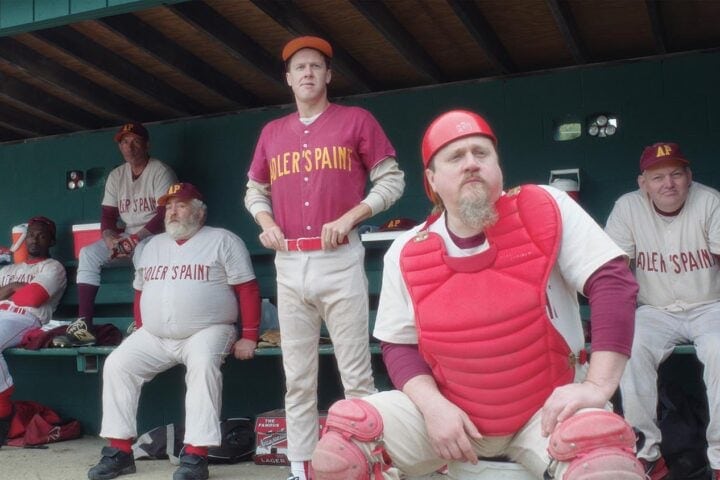The title of Carson Lund’s feature-length directorial debut, Eephus, refers to one of the rarest of baseball pitches, an unnaturally slow curveball with plenty of topspin that’s incredibly difficult to hit. At one point in the film, which depicts the final game between two recreation-league teams on a small-town Massachusetts intramural field due to be paved over, a player explains the philosophy behind the pitch to a teammate. As he does so, we’re subtly tasked with thinking of the film’s characters, so superficially awkward in their skill set, as extensions of the pitch: weapons of deception and surprise, not least of which for how they increasingly reveal their passion for the sport and each other as the game unfurls.
Both teams comprise rosters of middle-aged, mostly out-of-shape men for whom this rec league is more of an excuse to get out of the house than anything. One older player, Chuck (Theodore Bouloukos), sighs and groans every time he’s on Soldier’s Field and an opposing batter scores a hit, not because he’s concerned about giving up a run to the other team, but because it means this play will involve sprinting. At first glance, these men, who carry cases of beer to dugouts as if they were pieces of equipment, come off as hobbyists at best. But as they keep finding ways to prolong their last game together, the seriousness with which they take both baseball and the shared bond it forges among them displaces the early, gentle humor at their expense.
Lund, also serving as editor, matches the deliberately drawn out pace of the game by emphasizing the elegiac atmosphere around Soldier’s Field. The vendor running the pizza truck that sits idly in the lot seems to see his looming retirement as determined by the closing of the field. A scorekeeper, Franny (Cliff Blake), is chummy with the players even as he marks the game’s stats with a careful scrutiny worthy of official review. He even imparts occasional nuggets of sports wisdom, such as the measure of an athlete being the heart that he brings to a game. Locals passing through the park take brief, slightly amused measure of the game being played before going about their day, intrigued but not enough to hand around for long.
Greg Tango’s cinematography highlights the amber foliage of New England in autumn and the faint sunlit glow of morning giving way to late afternoon. Numerous shots glance away from the field entirely to take in the cool blue of a cloudless sky or something as mundane as the parking lot. The film slowly maps out the surroundings to the point that the viewer might start to feel nostalgic for this soon-to-be demolished park and agree with one player who glibly huffs, “It’s a shame those pricks are building a school here.” Lund gives away a clue as to an unlikely inspiration for Eephus in an early radio announcement by one Branch Moreland, voiced by none other than documentary legend Frederick Wiseman, whose own mastery of patiently exploring an environment and its denizens can be felt in the film’s unhurried, lived-in pace.
Though set in the 1990s, Eephus feels particularly keyed to the current anxiety over the erosion of public gathering spaces and America’s so-called loneliness epidemic. While the film’s characters clearly care deeply for baseball, their increasingly desperate efforts to prolong the game make it obvious that their reasons for doing so go well beyond sport.
These men have grown close over years of playing together, and members of both teams constantly ask each other about their spouses and children, but theirs is a tacit understanding that without the excuse of baseball to motivate them to meet up, the bonds between them will slowly fray. That they go to such lengths to protract this final game, and in lieu of making far simpler plans for future meet-ups, is an irony that hangs over the final stretch of the film, but it’s one that Lund treats with elegiac empathy for the power of a shared interest.
Since 2001, we've brought you uncompromising, candid takes on the world of film, music, television, video games, theater, and more. Independently owned and operated publications like Slant have been hit hard in recent years, but we’re committed to keeping our content free and accessible—meaning no paywalls or fees.
If you like what we do, please consider subscribing to our Patreon or making a donation.




